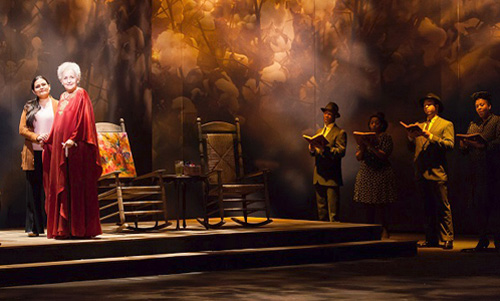
The American composer Ricky Ian Gordon (no relation) is among the freshest voices in music today. His largest opera is The Grapes of Wrath. He is currently writing operas for the Metropolitan Opera and Opera Theatre of Saint Louis.
His latest is A Coffin in Egypt, a yearning, nostalgic score starring the renowned mezzo-soprano Frederica von Stade, which premiered in Houston in March, and received its West Coast premiere in Beverly Hills in three performances in April. Kathleen Kelly sensitively conducted a nine-piece orchestra.
Von Stade plays the 90 year-old Myrtle Bledsoe, lone survivor at her family homestead in Egypt, Texas. It’s 1970. She married in 1900, experienced WWI, the Depression, WWII, and many personal tragedies and spousal infidelities. The opera, with a rhyming libretto and stage direction by Leonard Foglia, is based on a play by prolific dramatist Horton Foote.
Incidental characters from her life wander on and off in speaking roles. The only other singing roles are an itinerant quartet of Black gospel singers from the local church, who interject inspirational messages throughout the 75-minute piece.
Myrtle has lived in deep embitterment over most of her life, resentful at her husband’s treachery, lacking confidants, and retreating into her private world of books and painting. Critical to her environment is the Black side of town that has touched her deeply but from afar. Her husband’s greatest outside affair took place with a woman of black/white parentage he seems to have truly loved, and with whose community he genuinely, and generously related, despite the Jim Crow times.
As a symbol of how isolated Myrtle has felt in all her years in Egypt, the set décor (by Riccardo Hernández, lighting by Brian Nason) highlights fields of cotton, projected like wallpaper of the house that cotton built. But repeatedly this “perfect lady,” dressed in a regal red caftan, sings instead about the thick, tall stands of beautiful spring wildflowers she loved when she first arrived, and the long horse rides across the prairie she undertook to fill her days. Though outwardly a sympathetic character for whom we are meant to feel, she seems, in her self-absorption, constitutionally incapable of empathy for anyone.
Myrtle claims not to enjoy the Black gospel singing, but those voices have been reaching out to her for generations, trying to show her the value of friends, of hopes, of the meaning of life and the vision of a better world. She, wife of the cotton lord, sings solo. The cottonpickers sing together in gorgeous four-part harmony.
Among the family tragedies are two killings, with guns, that evoke today’s “Stand Your Ground” laws. The way people literally got away with murder in those days is worth a comparison to now: How different is it?
A Coffin in Egypt provides the opportunity to comment on the fate of opera in America. Only a handful of major opera companies existed in the U.S. – the Metropolitan and the New York City Opera in New York, San Francisco, Chicago – “major” being a company that might dare to premiere a new work.
Between the 1960s and the 1990s, numerous regional companies emerged, some of them even willing to score a coup by offering an untested work that would get noticed in the musical press. Oftentimes the company would engage in significant educational outreach to introduce the work to its audience.
Recent years have seen the demise of several high-profile companies, the New York City Opera, for one, and others in Connecticut, and Orange and San Diego Counties in California. In the years of a shrinking middle class, and declining opera attendance, it turns out that bankrolling expensive productions of Aïda and Die Meistersinger is not so important to the nabobs of industry who inhabit opera boards.
Gordon’s latest opera was a co-commission with Houston Grand Opera, Opera Philadelphia, and the Wallis Annenberg Center for the Performing Arts in Beverly Hills, showing that, from the bottom line perspective, larger companies are interested in smaller-scale works, and that newer venues, such as the “Wallis,” are throwing their hat into the ring of serious new operatic ventures without the enormous overhead of maintaining a standing company (with obvious implications for professional musicians).
Now, with the ubiquity of live theater broadcasts from the Met, we may see a trend of regional companies offering more intimate, less standard productions, at a deeply cost-saving discount, in order to survive. Audiences seeking out new works, or significant revivals, will be grateful.
Photo: Wallis Annenberg Center for the Performing Arts, photo by Lynn Lane.

MOST POPULAR TODAY

Ohio: Franklin County treasurer attends Netanyahu meeting, steps up Israel Bond purchases

After months of denial, U.S. admits to running Ukraine biolabs


“Trail of Tears Walk” commemorates Native Americans’ forced removal

‘Warning! This product supports genocide’: Michigan group aims to educate consumers



Comments